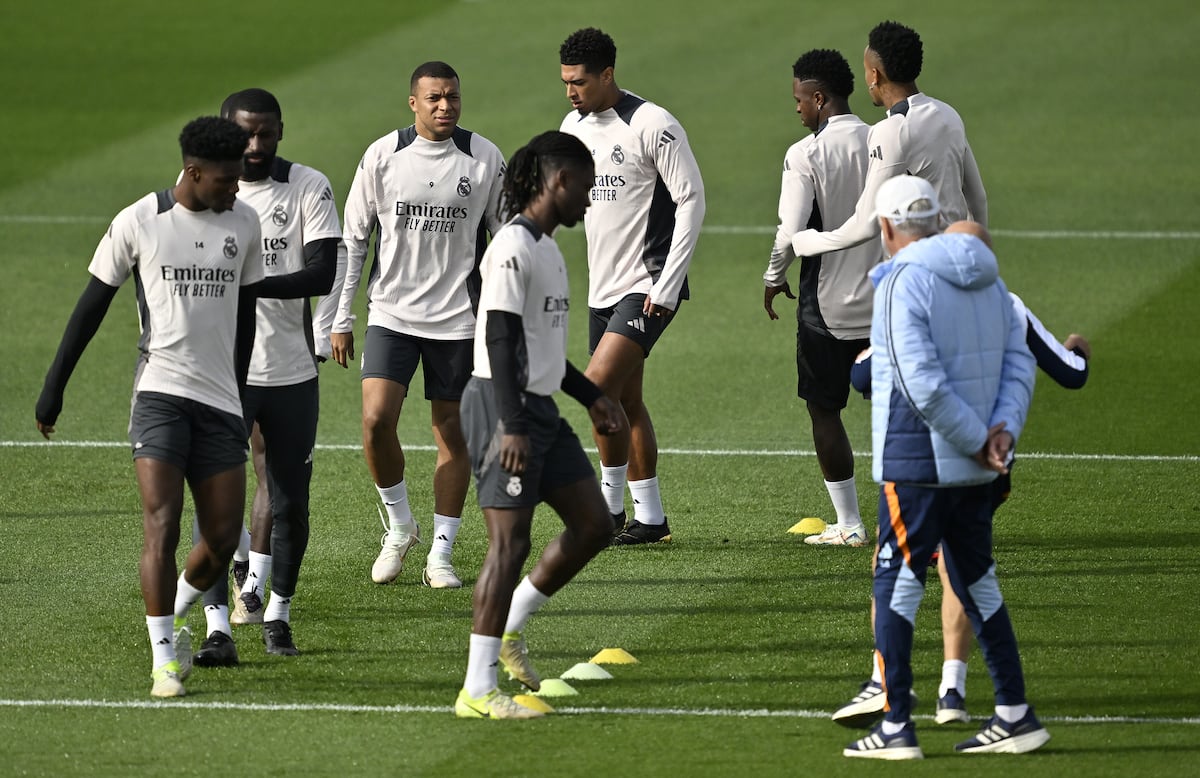Real Madrid remains sluggish: they are the third team to run the least in the Champions League | Football | Sport

The tragedy of the injury left Carlo Ancelotti a few more days to reflect in Valdebebas on the 0-4 blow in the classic, which in reality means continuing to chew on the problem he faced in almost the first bite of the field, on debut. League day in mid-August in Mallorca. “We are a very attacking team and defensive balance is a fundamental part,” he said that night. “This is everyone’s problem, not the strikers, midfielders or defenders.” In the Barça match, a problem remained open, based on the factor that the coaching staff considers decisive: the team does not run enough. In the classic match, the Bernabeu’s margin against the Blaugrana increased fivefold compared to last season.
In the October 2023 classic, Madrid’s outfield players covered 101.8 kilometers in Montjuïc, according to data from Hudl DaaS, compared to 103.2 kilometers for the locals, a 1.3% decrease. Over the 103 minutes that the return lasted, the difference was similar: 1% less. However, a week and a half ago, the difference was almost six times larger – 5.6% (94.3 kilometers from Madrid versus 99.9 from Barcelona in 93 minutes).
This was not an overnight phenomenon. Ancelotti’s men are covering an average of 3.5% less distance this League season than last season, dropping from 104.9 kilometers to 101.2. Almost always less than your opponent.
In the Champions League, a competition in which they return to the Bernabeu on Tuesday against Milan (21:00, Movistar), the poverty of their fitness is even more striking. Madrid is the third team to cover the shortest distance in each match out of the 36 teams in the league, according to official UEFA figures, which includes goalkeepers. Only Slovan Bratislava and Red Star Belgrade run less than 108.7 km than Real Madrid. Manchester City, for example, reaches 114; Liverpool, 115; Arsenal – 117, and Bayern – 120.7.
There has not yet been a Champions League night this season in which Madrid have dominated their opponents: they are behind by an average of 6.6%. The most striking case was the defeat in Lille, where the French traveled 122.8 kilometers against 111.9 kilometers for Ancelotti’s team, which regretted the deployment: “Today sadness is the feeling of the team. It’s possible to lose because it’s a sport, but we didn’t give a good feeling in the game; “That’s what worries me the most.” A few weeks later, when he recalled his first defeat on the track, the Italian concluded: “We didn’t compete there.”
The obsession had not left him for several months. Before hosting Dortmund on matchday three, he pointed in the same direction once again: “We are focused on better defense, which I think is the key to success this season,” he said. “We need to work more compactly as a team. “Sometimes the thought comes to press up, but the automation still doesn’t work.” Adjustments become more difficult if supplies dwindle, as the Italian pointed out after the disappointing draw in Mallorca: “It’s not a physical problem; It’s heartwarming.”
From last year to this year, there were corresponding changes in the squad: Kroos, who traveled 10.1 kilometers per game, left, and Mbappe arrived, who, according to Hudl DaaS, averaged 8.6 kilometers. The Frenchman covers the least distance in Madrid, although he has increased it slightly since last season at PSG, where he gained 8.3 kilometers per game, only more than the goalkeepers.
The New Year also brought changes to players’ records. Vinicius, who covered 8.9 kilometers per game last season, now clocks 9.2. He also improved his performance at high intensity, gaining 1001 meters at over 20 km/h, just up from 985 last year. Mbappé remains at high intensity in the 700m, behind all the other forwards: Rodrigo (741), Arda (763), Brahim (936) and Bellingham (908).
The Englishman, not focused on the new positions he has been given on the pitch since Mbappe’s arrival, is the starter who has reduced his physical workload the most, by 4.26%. If last year he traveled 9.9 kilometers per League game, then this year, in which he was washed out and removed from the area and goal, this figure remains at 9.5.
The next biggest decliner was Mendy (-2.2%). And the biggest risers were Rudiger (6.3%), Modric (4.9%) and Tchouameni (6.8%).
